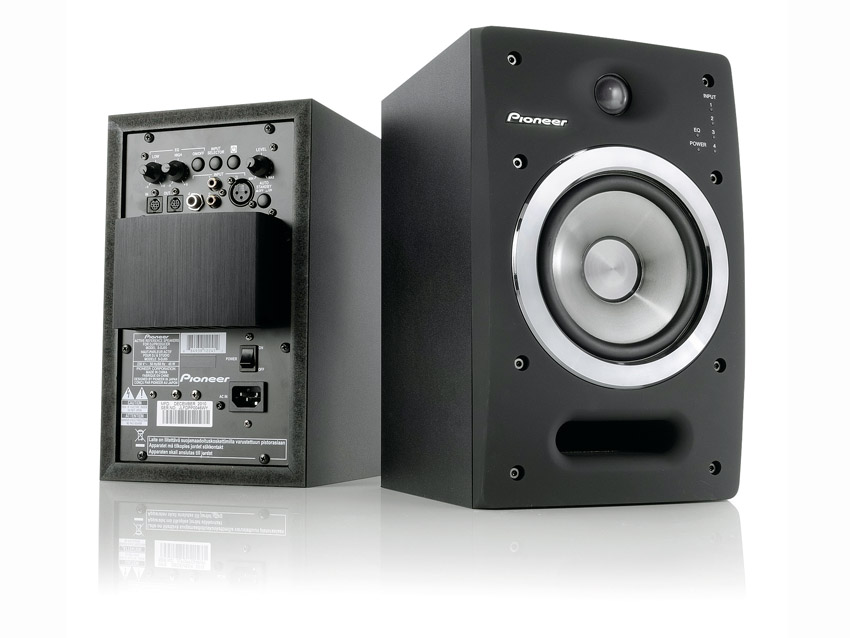MusicRadar Verdict
A classy combination of high quality audio and flexible control at an accurate price.
Pros
- +
Remote control of rear-panel options is clever. Clean but robust sound. Will appeal to DJs and producers alike. Great low-end response.
Cons
- -
Top-end can be slightly over bright.
MusicRadar's got your back
Pioneer is no stranger to the world of speaker design or to that of DJing and its latest products are aimed at building a further bridge between them.
The S-DJ05 and '08 monitors are speakers designed for the studio and the DJ-alike with a high-quality monitoring signal for the former and some neat trickery aimed at making life in the home booth that much easier.
Overview
The '05 model is the subject of this review and like its big brother, it offers active monitoring. The '05 offers a 5" silver cone on the front with separate 2.5cm tweeter above, while the back panel is unexpectedly busy, with no less than four input sources available to you.
As well as an XLR input, two phono ports are provided, as is a TRS balanced quarter-inch jack input. Buttons on the rear panel allow you to toggle between these input sources (with LEDs on the front panel confirming your current choice), while a level dial can be adjusted to taste.
Like most modern monitors, EQ can be adjusted via High and Low dials and there's a separate button to toggle this tone modification on and off as well as an overall power button.
However, the remaining ports on the rear hint at Pioneer's more radical design, namely that of 'remote' control of your settings via a separate device. Via break-out cables which connect to both sides of the stereo mix, the S-DJ speakers ship with a 'desktop' circular remote control which offers a range of functions.
Firstly, in Mackie Big Knob style, it provides a large rotary for level control but, on its rear edge, it also allows you to toggle the EQ of the speakers on and off, as well as mute them altogether.
Want all the hottest music and gear news, reviews, deals, features and more, direct to your inbox? Sign up here.
The remote will also let you choose between input sources, so the great advantage, particularly in the studio, is that you can connect all sources you could conceivably want to monitor and then, with the flick of a switch, cycle through them without any need for re-patching.
It's a neat and tidy system and, puns notwithstanding, a pioneering one, especially at this price.
The sonics
All the trickery in the world would be worth nothing if the S-DJ05's offered poor sound quality but fortunately, that's not an issue here. The woofer and tweeter are driven independently via the unit's built-in bi-amp circuit and, as these are speakers primarily aimed at Dance music producers, we were particularly pleased to note the solidity of the bottom end which is impressive, even on this smaller model (its LF cutoff is at 53Hz).
The adjustable EQ helps and while in the neutral position we found the top end just a little over-bright, there is nothing serious to report here and certainly nothing that can't be adjusted via the rear tone controls.
The mid-range is detailed too, allowing you to pick up harmonics in low-frequency content without this area being too dominated by an abundance of spanking bass below.
All in all, this system really impressed us and it's always refreshing to find companies that are looking to provide solutions for those with diverse musical lives. There are now so many gigging Dance music producers, it makes sense to offer them a practical monitoring solution which is as 'at home' in the studio as it is onstage.
Future Music is the number one magazine for today's producers. Packed with technique and technology we'll help you make great new music. All-access artist interviews, in-depth gear reviews, essential production tutorials and much more. Every marvellous monthly edition features reliable reviews of the latest and greatest hardware and software technology and techniques, unparalleled advice, in-depth interviews, sensational free samples and so much more to improve the experience and outcome of your music-making.

